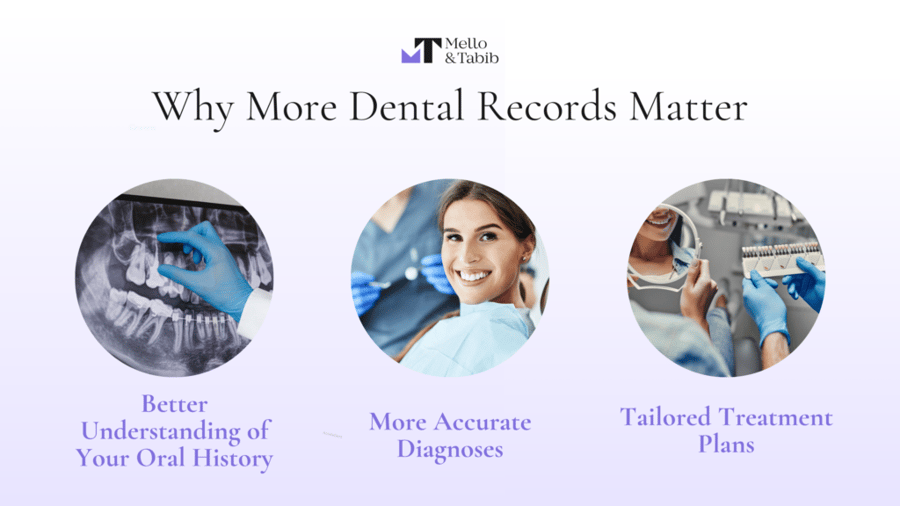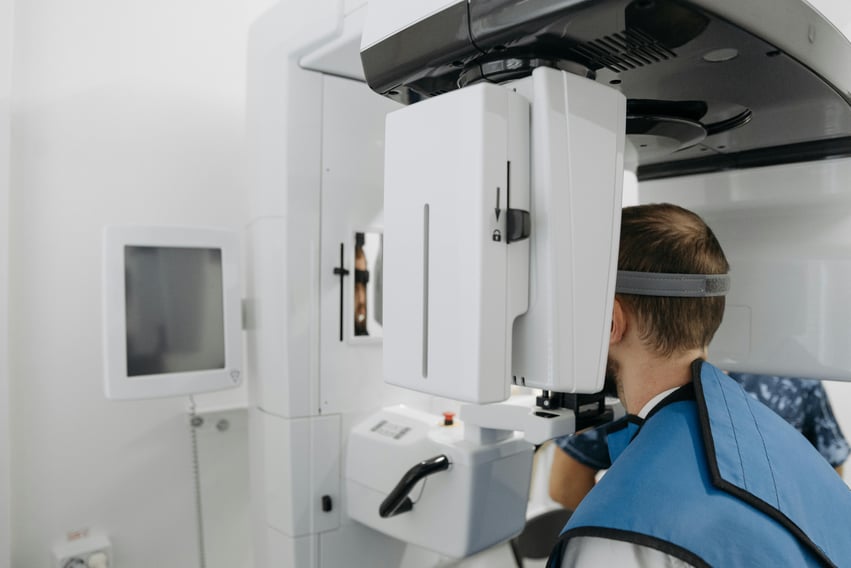Can Additional Dental Records Affect My Treatment Plan?
January 12th, 2024
5 min read

When it comes to dental treatment, having a complete picture of your oral health is key. This is where additional dental records come in. They’re not just pieces of paper or digital files; they are crucial tools that can significantly shape your treatment plan.
At NYC Smile Design, we’ve seen firsthand how a comprehensive collection of dental records can enhance the accuracy and effectiveness of our treatment plans.
This blog explores how additional dental records can positively influence your dental care, especially when you’re about to undergo a dental procedure or are in the midst of treatment.
Why More Dental Records Matter
In the journey towards optimal dental health, the importance of having extensive dental records cannot be overstated. These records are more than just historical data; they are a window into your dental past and present, playing a crucial role in shaping your future oral care. In this section, we delve into why accumulating more dental records is essential. Understanding the significance of your records will illuminate how they are instrumental in guiding your dental treatment toward success.

Better Understanding of Your Oral History
Gaining insight into your dental history is a vital step in effective dental care, and additional records play a key role in this process. These records provide your dentist with a comprehensive view of your dental past, encompassing everything from previous treatments to ongoing issues or any special conditions that may be affecting your oral health.
For example, if you’ve had a root canal treatment or a dental implant in the past, this information is crucial for your current dentist to know. Such procedures can affect how future treatments are planned and executed. Similarly, if you have a history of recurring issues, like gum disease or frequent cavities, your dentist can use this information to tailor their approach, perhaps focusing more on preventive measures or monitoring certain areas more closely.
In addition, these records can reveal the progression of dental conditions over time. If you’ve had fluctuating patterns in oral health, such as periods of significant improvement or decline, understanding the factors that contributed to these changes can be invaluable. It helps your dentist not only in addressing current issues but also in anticipating potential future problems and implementing strategies to avoid them.
By providing a detailed look at your dental past, additional records enable your dentist to build a more complete and accurate picture of your oral health. This comprehensive understanding is essential for delivering care that is not only effective but also personalized to your specific dental journey.
More Accurate Diagnoses
The ability to make a precise diagnosis is often the cornerstone of effective dental treatment, and this is where past dental records become invaluable. They provide a broader context beyond the current state of your teeth and gums, uncovering changes or patterns that might not be immediately apparent. For instance, by comparing old X-rays with new ones, your dentist can track the progression of a dental issue, identifying subtle changes that may have occurred over time.
This historical perspective is particularly important when unexpected issues arise or if additional work becomes necessary. For example, during orthodontic treatment, an older X-ray may reveal underlying bone irregularities that require reshaping, a condition that might not have been evident in the initial examinations. Such discoveries can significantly alter the course of treatment, necessitating additional procedures to ensure the best possible outcome.
Moreover, past records can sometimes reveal dormant issues that were not initially diagnosed. A previous X-ray or dental chart might indicate early signs of conditions like hidden tooth decay, which, if not addressed timely, could lead to more complex problems. Recognizing these issues early on allows for prompt intervention, potentially saving the patient from more extensive and invasive treatments later.
In essence, incorporating a thorough review of past dental records into the diagnostic process ensures a more comprehensive understanding of your oral health. This holistic approach not only aids in accurate diagnosis but also in anticipating and preparing for additional treatments that might be needed, thereby enhancing the overall effectiveness of your dental care plan.
Tailored Treatment Plans
The depth of your dental history significantly influences the customization of your treatment plan. When your dentist has a comprehensive understanding of your past dental experiences, they are better equipped to design a care regimen that specifically addresses your unique needs. This personalized approach not only targets your current dental issues but also considers past treatments and their outcomes, which can lead to significantly better results.
With the introduction of additional dental records, there may be instances where the planned course of treatment needs to be altered. For example, the discovery of a complex root canal treatment in your history might prompt your dentist to adjust a proposed treatment plan, or even refer you to a specialist like an endodontist for more advanced care. This kind of modification is not uncommon and reflects the commitment to providing you with the best possible dental care.
Moreover, additional records can sometimes reveal conditions that were not initially apparent. Let’s say your new records show a history of gum disease; your dentist might then include more periodontal care in your treatment plan. This might involve more frequent cleanings, specific gum treatments, or even collaboration with a periodontist to ensure comprehensive care.
In some cases, the information gleaned from your past records might also lead to less invasive treatments. For instance, if your records indicate a strong response to non-invasive treatments in the past, your dentist might opt for similar strategies before considering more extensive procedures.
In conclusion, having a complete set of dental records allows your dentist to create a treatment plan that is not only tailored to your current dental situation but also informed by your dental history. This holistic approach to dental care ensures that your treatment plan is as effective and efficient as possible, ultimately leading to improved oral health and satisfaction with your dental care experience.
What Kind of Records Can Help?
- X-rays and 3D scans: These images give a detailed view of your teeth and jaw, helping in procedures like implants or braces.
- Photographs and videos: These can show how your smile and teeth look and function in real-time.
- Previous dental charts and notes: These documents can provide insights into past treatments and ongoing care strategies.

Getting the Records: A Team Effort
Obtaining your comprehensive dental records often involves collaboration between you, your current dentist, and any previous dental care providers you may have visited. This team effort is a standard and necessary practice in dental care, ensuring that your new dentist has all the information they need to provide the best possible treatment.
Initiating this process typically starts with a request. You can ask your current dentist for any records they might have on file. If you’ve seen multiple dentists or specialists in the past, it’s a good idea to reach out to each of them. Most dental offices have established protocols for handling such requests and can transfer your records to your current dentist’s office. Digital records can often be sent securely via email or through specialized medical data transfer services, making the process faster and more efficient.
It’s also important to be aware that in some cases, there may be a nominal fee associated with copying or transferring records, especially if they are extensive or need to be mailed.
Conclusion: A Step Towards Improved Dental Care
In conclusion, additional dental records play a vital role in shaping your dental treatment plan. They provide your dentist with the comprehensive information needed to make informed decisions about your care. If you’re considering a dental procedure or are currently undergoing treatment, it’s worth discussing with your dentist whether obtaining additional records could be beneficial. This proactive approach can lead to more precise treatments and improved dental health outcomes.
If you’re interested in understanding more about dental procedures and how your dental history could impact your treatment, consider reading our related blog, “What You Need to Know About Dental Insurance.“ It’ll give you insights into the financial and insurance aspects of dental care, complementing what you’ve learned here.
Topics:

